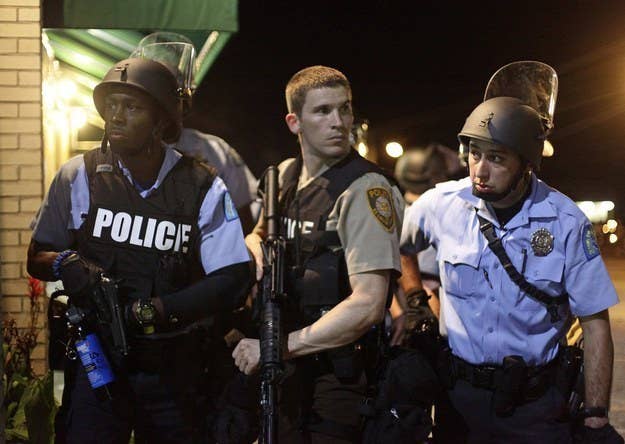
WASHINGTON — Advocates of police demilitarization are calling on Washington leaders to move as quickly as possible with efforts to restrict or end the practice of giving free military hardware to local police forces. That could mean presidential action, or legislation in Congress. Advocates don't care. They just want it now.
"If there were votes on the floor of the House in next two weeks, the sentiment would be there to change things," said Tim Lynch, director of the libertarian Cato Institute's Project on Criminal Justice. "But I am concerned people's concerns will move on to other matters in the next two weeks."
Police demilitarization's moment has arrived, thanks to the images of heavily armed police on the streets of Ferguson, but activists aren't willing to say the current outrage will translate into action in Washington. Hopes were bolstered over the weekend when the White House ordered a top-down review of federal programs that funnel military weapons to local police forces. Advocates aren't sure what to make of the review yet, though they mostly see it as a positive sign.
"We're definitely encouraged," said Kara Dansky, lead author on the ACLU's comprehensive report on police militarization, released just weeks before the shooting of Michael Brown. "We hope that it results in legislation."
Danksy called on the president to immediately end several military equipment giveaway programs right away by ordering the Department of Defense to stop giving local forces free surplus gear, among other options. She also said Obama could order the Department of Homeland Security to forbid local forces from using DHS grant money to buy military weaponry and other equipment.
After that's done, she said the focus could shift to moving several demilitarization-related bills filed since Ferguson through Congress.
Lynch is more wary of the White House review, warning that a long look at the issue could slow down the legislative gears and cause demilitarization legislation to lose momentum as politicians shift focus to the midterm election. He called on Congress not to wait for Obama's review to be finished before going ahead with a legislative push.
The issue is a complex one; many police departments want military equipment and many politicians still want them to have it, too. Like Dansky, Lynch said the best and easiest place to start the conversation about militarized police is by ending the federal giveaway programs.
"I think the decision making at the local level has been distorted by these giveaway programs. Everything has been distorted by these giveaways," he said. "If a chief has to decide whether to buy two cop cars or to give raises to his officers...or buy a mine-resistant truck from the Pentagon, these things will sort themselves out pretty well."
The "direct relationship between local police forces and the Pentagon" when it comes to surplus military equipment means civilian leadership is often out of the loop and don't know their local force has an MRAP until they see it, Lynch said. Ending the giveaways would force more oversight of police equipment by the governments that have to buy it.
"If the state legislature of Texas wanted to set aside money to buy military equipment there's more check and balance there than to have a direct relationship between DoD and a small police department," he said.
The ACLU study is one of the few comprehensive looks at militarization in local police forces. Dansky said the administration could easily dramatically increase the amount of data available to scholars by requiring beneficiaries of the free military hardware to track when they're used, the "underlying purpose," and data "on the race and ethnicity" of those affected. The ACLU study found a "disparate impact" from military surplus police equipment on minority communities and found that 80% of the time the equipment was not used to help in an emergency situation, but rather in the service of a police raid, generally on a property suspected of being involved in the drug trade.
Danksy said Obama should also direct the Justice Department to create more and readily available data on the use of surplus military equipment in local police force hands.
The White House says its review is meant to audit good programs that have gone awry.
"The goal of those programs is ostensibly a good one, that it was recognized after 9/11 that there were some local law enforcement organizations that didn't have the kind of equipment that they might need in the event of an emergency," White House Press Secretary Josh Earnest said at Monday's regular press briefing. "The question, though, is, is the program operating as was intended? Are there situations in which local law enforcement organizations are getting equipment that they don't actually need? Are they using government funds to acquire equipment and use it in a way that's consistent with that way that equipment was intended to be used?"
Earnest said the White House's office of Management and Budget will oversee the review to "ensure that ultimately these local law enforcement organizations and the Department of Defense are being good stewards of taxpayer dollars."
Earnest did not provide a timeline for the review. Lynch said whatever happens, it needs to happen now. Though conservative critics of militarization are seeing their stock rise after Ferguson, Lynch said it would be wrong to assume that the politics of arming police with military surplus has changed forever. It's better to focus on the short term, he said
"The potential is there. There's been the tension of the last two weeks," he said. "There's tensions and there's concern but…I don't see a huge new moment that it's inevitable. That remains to be seen."
